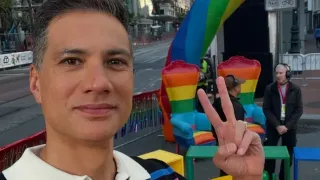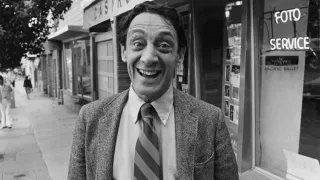December 25, 2014
Sit/Lie Law Still Draws Concern
Kilian Melloy READ TIME: 4 MIN.
Four years ago, San Francisco voters passed the sit/lie law, which bans people from sitting or lying on the city's sidewalks between 7 a.m. and 11 p.m.
From the beginning, opponents have said the law amounts to harassment of homeless people, including LGBT youth. Supporters have said the ban is needed to keep the sidewalks open for businesses and residents.
Since the law passed in November 2010, the discussion has died down, and there hasn't been much analysis on data related to the ban. But the law is being enforced, and it still evokes strong feelings.
A tent on the sidewalk in the north Mission provided makeshift protection from the rain last week. Photo: Rick Gerharter
"The biggest problem with sit/lie is we can keep ticketing and keep jailing, but it doesn't end homelessness, so people have nowhere to go," Jennifer Friedenbach, executive director of the city's Coalition on Homelessness, said in an interview last week. Friedenbach said when people don't pay their citations, they may get warrants, and then they can be blocked from getting into public housing or get arrested.
According to Officer Grace Gatpandan, a San Francisco Police Department spokeswoman, from January through December 17 this year, there have been 514 warnings and 776 citations issued citywide. Data by district and historical figures weren't immediately available.
Data on how often people don't pay their citations - $50 to $100 for a first offense - isn't readily available from San Francisco County Superior Court or other agencies, but longtime gay housing activist and sit/lie opponent Tommi Avicolli Mecca said it's time for the law to go.
"I really call on the leaders of the LGBT community to look at this law and to make it a priority to repeal this law, because it does affect the poorest of folks in our community," said Avicolli Mecca, who works at the Housing Rights Committee of San Francisco. "It affects them by affecting their ability to get housing."
"What is the point of having this law in the first place?" he added.
Moving People Along
Andrea Aiello, executive director of the Castro/Upper Market Community Benefit District, expressed support for the ban.
"I think that there are some times, when people spend five or six hours in one spot sitting on the sidewalk, that it's helpful for police to have a tool to move people along," especially if someone is blocking the path, Aiello said.
Captain Raj Vaswani heads the Park police station, which oversees part of the Castro neighborhood, as well as much of Haight Street. That neighborhood is near Golden Gate Park, which serves as a haven for many homeless people, who often populate Haight Street and share sidewalks with shoppers and tourists. Reports of what's been described as "aggressive" panhandling in the area helped spawn the sit/lie law.
Vaswani said the ban has been helpful.
"I think it is important for the merchants and residents not to have people in front of their store for long periods of time," Vaswani said, and it's "important for us to at least have that point to engage with somebody."
That's where sit/lie has been effective, he said.
"We're not trying to make it unpleasant for the homeless," Vaswani said. Police are "trying to make it a good place to shop and a good place to live."
He added, "We do warn individuals and try to gain their cooperation," and officers have "a good working rapport" in most of the interactions. "They know who they need to warn," and "who gets cited."
Often, Vaswani said, when officers see someone new to the area, they'll ask if the person's looking for services and tell them about available resources. Most of the officers who work on Haight Street have been to specialized training, he said.
Avicolli Mecca said the law's being "selectively enforced," where police pass over youth sitting on the sidewalk who look "respectable" and instead approach those who appear to be homeless.
Vaswani said he wasn't aware of any selective enforcement. He's seen officers walk by homeless people violating the law without citing them.
"They don't always enforce," he said. "It just depends on what they have on their plate" with other calls.
The captain wasn't able to provide statistics on sit/lie citations that have been given in his district.
Last Thursday night, one homeless man on Haight Street, who didn't want his name published, said he was cited for violating the sit/lie ban six months ago. He didn't pay the fine and eventually got a warrant, spent about a day in jail, and was sent to a program for his drug and mental health issues, he said. The man, whose account couldn't immediately be verified, said that he'd been "talking shit" to police when he got into trouble and the situation had "escalated."
'Incredibly Useful'
The Tenderloin is another neighborhood known for drawing homeless people, but it appears sit/lie warnings and citations are issued infrequently. (Police have to issue warnings first.)
According to Captain Jason Cherniss, who oversees the Tenderloin Station, police in his district gave 12 warnings and 12 citations in 2011. This year, through December 10, there were 27 admonishments and nine citations. The figures reflect only the work of Tenderloin officers, and don't show warnings or citations written by other officers or specialized units.
The ban has been "an incredibly useful tool," Cherniss said.
He said interactions with people who're sitting or lying down usually start with the question, "Do you need help?"
It can give officers a chance to encourage people who are sleeping in the cold to get services or "at least get up and move around a little bit" to get their blood flowing.
"We can do that now because we have sit/lie," Cherniss said.
The sit/lie law also gives police "a pretext" to look into activity that's generating complaints, such as suspected drug dealing, he said.
The captain also said, "There's a difference between enforcement and action." Even though sit/lie has enabled police to approach people who are sitting or lying on the sidewalk, "we don't necessarily cite them for that."
Asked about the ban resulting in harassment and wasted resources, Cherniss said, "We expect all our officers to engage in community policing from a conscientious and compassionate perspective, and we expect them to consider the spirit of the law and understand the letter of it."
Police "don't always have to engage in enforcement when it comes to an infraction," he said, but they do have to respond "to the concerns of the community," he said.






